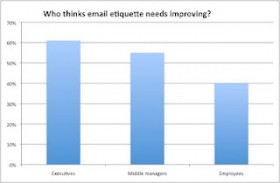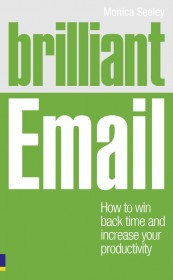When will everyone understand that email and social media communications never disappear into the ether? And why don’t we realise that our emails provide an instant and probably permanent picture of us, our culture and our business office? Good email etiquette is as vital as managing the risk of a breach of security and compliance as discussed recently on the BBC Today programme.
Today, even if we delete an incriminating email or one we’d rather forget – it will still be sitting on some server somewhere or in a ‘cloud’ waiting to rain down disaster at any time up to decades later.
This is particularly the case if your company is linked to the financial, legal, public or professional services world. We all have to keep records for a minimum of six years and in regulated environments like finance and commerce, communications are often retained for ….ever and can be requested as evidence.
Sadly, history keeps repeating itself as I’ve been writing for over a decade about extremely avoidable ‘emailgate’ type disasters. From ‘Govegate’, to Microsoft antitrust, Merrill Lynch, Norwich Union (in 1977), BP emails revealing lying about the oil leakage and putting cost cutting before safety, to the recent memorable and revealing emails and texts exchanged by executives, editors, MPs and even prime ministers called to appear at the Leveson inquiry into phone hacking at the News of the World. But top of the mind is Barclays, the latest large corporate brought down by inappropriate use of email.
 |
“Dude, I owe you big time! Come over one day after work and I’m opening a bottle of Bollinger,” was seductive and highly conversational. Not really the terms and phrases you’d expect for something so important and highly sensitive as fixing the interbank lending rates. Indeed Traders made their requests in person, via email and through electronic “chats” over an instant messaging system with little concern about the content, tone or image they were leaving behind.
And that’s the point. Neither they or their organisation probably ever considered that their words would or could be broadcast worldwide several years after they were written. Even if they had deleted the communications they would still exist somewhere and could be retrieved. The damage caused by casual communication is not just to the image of the individuals involved but can take years and large amounts of funds to rebuild the confidence of customers and the markets in which they operate.
What Barclays did was wrong. Poor use of email and email etiquette just made the evidence easier to find. Perhaps it’s time for ‘slow email’ and more guidance on how email is used in the decision making process?
Tags: corporate email etiquette, email best practice, email etiquette dos and don'ts, email etiquette rules, email etiquette training
Last week it was the CBI report on the need to improve basic literacy skills which prompted my blog on the dire state of email etiquette. Simultaneously there was the excellent report ‘e-nough alre@dy from Grossman Group a leading American communications consultancy. It found that whilst email is perceived as a very effective communications tool many felt email communications needed improving. In particular email etiquette needed attention. The break down is shown below.

They key issues relating to email etiquette being:
This looks just like the list of challenges which we hear when running workshops and asking the question ‘what annoys you about email‘.
Are these results surprising when so few people have ever been trained to use email properly? What ever happened to all those workshops on letter writing which many of us who belong to Generation X had to attend?

‘The Debbrets handbook for email etiquette’ – Jerry Stimfig
Whilst many of us were used to writing social letters, once we started work it was off to learn about the principles of writing business letters.
Email has now become the business letter of the 21st century. Yet why are so few organisations reluctant to run email etiquette courses? Those that do are often shutting the stable door after the horse has bolted: their organisation has become part of the latest media disaster or emails are being used as evidence in court. Poor email etiquette can be very costly.
Budgets we know are tight and so at the very least you could provide your staff with a set of sound email etiquette guidelines. These should include:
Please feel free to use the Mesmo Consultancy ‘Email Etiquette Checklist’ posted in an earlier blog. Alternatively we would be more than happy to come and talk about our Brilliant Email Etiquette master classes and how these can help you save time and money.
Tags: corporate email etiquette, email communications, email etiquette dos and don'ts, email etiquette rules
A basic level of literacy is fundamental to business and not least using email. The recent survey by the CBI and others reveals that a fifth of organisations now provide extra literacy training. Moreover the level of literacy has fallen over the past decade.
This mirrors Mesmo Consultancy’s own experience: – teaching Generation Y and the Millennial how to write a proper email is a key priority for most workshop sponsors.
 |
| An aid to better email etiquette? |
Clearly our eduction system has something to answer for, but is Facebook and the like also part of the problem? Social media enables us to writing quick often slap dash posts with no reference to grammar and spelling. Many then feel they can carry such standards over in to business and their email etiquette. Whereas traditional writing instruments force one to think before commiting to paper. After all who wants to send a letter/card with lots of deletions and messy crossing outs.
Poor email etiquette can be very costly – see previous blogs and articles.
We have produced a short free email literacy checklist to help people quality check their emails before hitting send.
It took me several goes to pass my English O’Level (as it was in those days). It was a pre-requirement for University entrance even though I was to study Chemistry. Modern spell and grammar checkers help but they do not spot the nuances between say ‘there’ and ‘their’ or where to put the apostrophe. My bible is Lynne Truss’s wonderful book ‘Eats Shoots & Leaves’. Perhaps a copy should be given to every school leaver?
This week’s EmailDoctor tweets will highlight some recent email etiquette howlers which have turned up in my inbox.
Dr Monica Seeley, founder of Mesmo Consultancy has spent the last fifteen years coaching and training people from a wide range of organisations and businesses to use email more effectively to improve personal and business performance. She is passionate about helping people save time by using email effectively and has written several books on the subject, the latest being Brilliant Email. She runs regular workshops and masterclasses on email best practice.
Tags: corporate email etiquette, email etiquette, email etiquette dos and don'ts, email etiquette training
If you still have any doubts about the extent of email overload take a look at this recent Infographics from Online It Degree. Email is now the biggest drain on our own and our collegues productivity. Mesmo Consulatncy’s own data collection from our clients shows that we waste up to 21 days per person per year. Moreover email overload is often a major cause of stress. Figures from the USA now show that absenteeism through stress in rising.
Created by: OnlineITDegree.net
However investing ninety mintes of your time in one of our Brilliant Email Master classes has helped many business reclaim up to 45 mintes of the time lost through email overload.
Dr Monica Seeley, founder of Mesmo Consultancy has spent the last fifteen years coaching and training people from a wide range of organisations and businesses to use email more effectively to improve personal and business performance and manage the risk associated with cyber crime. Monica is a Visiting Senior Fellow at Cass Business School City University and Bournemouth University Business School. She is passionate about helping people to save time by using email effectively and has written several books on the subject, the latest being Brilliant Email. She runs regular workshops and masterclasses on email best practice.
Tags: email management training, email overload, email stress
You receive an Out of Office Message, what is your natural reaction next time you want to email that person? Aside from a touch of jealousy as they are on leave and have escaped the daily dose of email overload, you just send them another email.
Is that the best email behaviour for those serious about stopping email overload and reducing the resulting wanton waste of time (estimated now to be half a day week).
One in five business users now receive in excess of seventy email a day. Yet our own and that of others research shows that less than a third of all incoming email is ever read. Take a week off and there will be at least 350 emails waiting for you.
 | ||
| My notebooks from our sponsor BomoArt |
There is a very high chance that your email will either be missed or redundant by the time its read. However the recipient may not know that and so more unecessary emails flood back into your inbox.
Be innovative. Don’t firing of more emails. Instead write down the things you want to email the person about and either send them one email on their return or and better still talk to them.
Now watch the email traffic go down along with the email overload. You might even find you too reach the empty inbox status more quickly.
This is part of an ongoing series of notebook stories to reduce email overload – see also my recent column in TechRepublic.
Dr Monica Seeley, founder of Mesmo Consultancy has spent the last fifteen years coaching and training people from a wide range of organisations and businesses to use email more effectively to improve personal and business performance and manage the risk associated with cyber crime. Monica is a Visiting Senior Fellow at Cass Business School City University and Bournemouth University Business School. She is passionate about helping people to save time by using email effectively and has written several books on the subject, the latest being Brilliant Email. She runs regular workshops,webinars and masterclasses on email best practice.
Tags: email management training, email overload, empty inbox, inbox zero, notebook stories, out-of-office messages